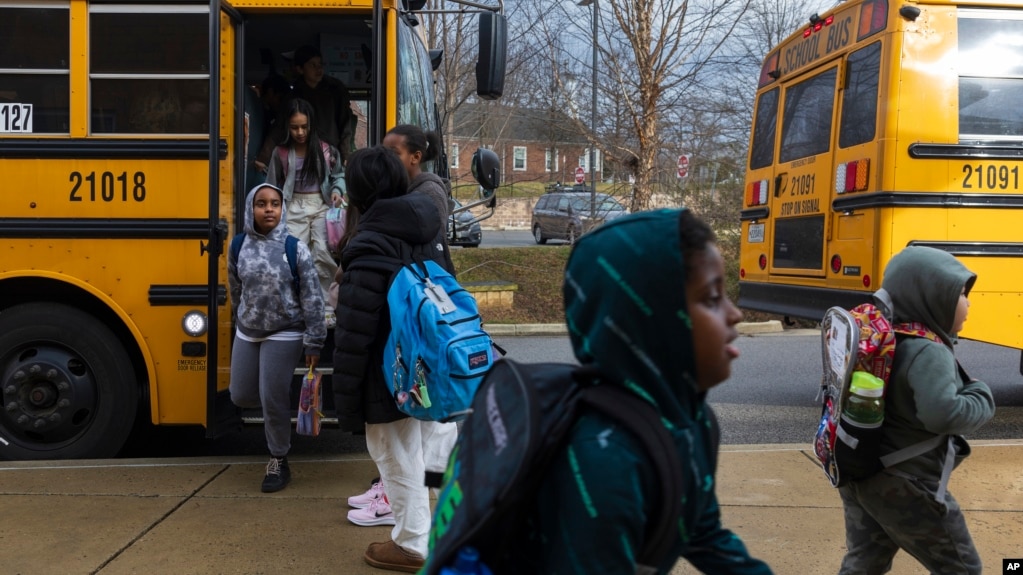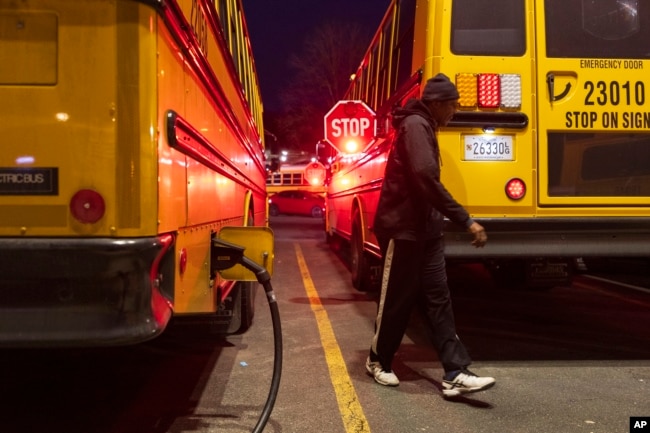AUDIO
Costs, Performance Influence Decisions on Electric School Buses

The first electric school buses in the United States began operating about 10 years ago in California. Fewer than one percent of the 489,000 school buses in the U.S. were electric at the end of 2023.
However, the number of electric school buses currently operating or that have been ordered from a manufacturer has more than tripled in the last two years. That information comes from the Electric School Bus Initiative of the non-profit World Resources Institute, or WRI, based in Washington D.C.
The WRI said that increase means 10 times as many students now ride electric school buses — from around 20,000 in 2020 to 200,000 three years later. The number of states with electric bus laws or goals also grew from two to 14 between 2020 and last year.
People and organizations that want electric school buses can find it difficult to get local officials to find ways to pay for them.
“It’s just a matter of breaking down these barriers,” said Alicia Cox. She is a mother of two in Jackson, Wyoming. Her state is the only one that does not have a single school district with an electric bus operating or on order.
Cox’s son, a second grader, often rides a diesel bus to school.
Problems with electric buses
Parents and local officials say one of the biggest problems with electric school buses is their cost. Even with the fuel and maintenance savings of an electric bus, they cost two to three times more than diesel fueled buses.
The Environmental Protection Agency says it has a $5 billion program for zero-emissions buses. The money comes from an infrastructure law passed by the U.S. Congress under the administration of President Joe Biden in 2021. Nearly 440 grants and rebates totaling about $1.8 billion have already been released. The goal of the federal money is to replace thousands of buses across several hundred school districts in the U.S.
Demand for the money has been “heartening,” said Christine Koester. She is a director for the Clean School Bus Program at the EPA.
In addition to federal money, supporters have successfully pushed to use other money. That includes money from federal government legal cases, like the Volkswagen emissions settlement. In that case, the U.S. government brought legal action against the German carmaker for having a system that gave false car emissions results.
For school districts that are not receiving federal money, there are other possibilities. These include leasing buses from companies that supply the buses and the equipment needed. This method spreads costs out over time.

An electric school bus driver examines his safety stop signs before driving to school inside the Montgomery County Schools bus lot, Friday, Feb. 9, 2024, in Rockville, Md. (AP Photo/Tom Brenner)
Choices
Dearborn Public Schools is a Detroit area school district in the Midwestern state of Michigan. Seventy percent of families in the district are poor. Communications director David Mustonen said the district was interested in new technology when it began operating its first electric bus in December 2022.
The district bought an electric school bus with a $300,000 federal grant. The bus has been operational only about three of the 12 months since then. That is because of maintenance needs and learning about the device. That is not discouraging Dearborn from moving forward with adding 18 additional electric school buses. But those problems represent a risk other school districts may not want to take.
There are other problems slowing the change to electric buses. School districts sometimes take a long time to approve electric buses. Manufacturing of the buses can be delayed, and electric buses require special electrical connections for charging. And, of course, electricity costs money, too.
Wyoming refused federal money from the EPA because of concerns about how far the buses could travel. There were also concerns about cold temperatures. Wyoming is a very large Western state where travel distances are big and, in the winter, temperatures can get very cold. Electric battery performance decreases in cold temperatures.
“Even though diesel is not as clean, it’s getting the job done,” Cox said schools and fleet managers tell her.
Words in This Story
school district – n. an area established by a local government for the administration of public schools which has a budget and is supervised by local government officials
maintenance – n. the act of keeping property or equipment in good condition by making repairs
zero-emissions –adj. letting off no gasses that people do not like or considered harmful
grant – n. an amount of money that is given by a government to be used for a particular purpose
rebate – n. an amount of money that is paid back to you
lease – v. to use (something) for a period of time in return for payment
discourage – v. to make someone less likely to do something; to make someone less hopeful about doing something
fleet –n. a group of vehicles that is supervised for an organization or force
https://learningenglish.voanews.com/a/costs-performance-influence-decisions-on-electric-school-buses/7504773.html